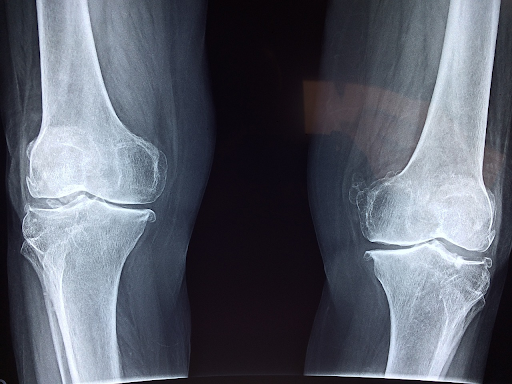
Analyzing The Link Between Osteoporosis & Poor Air Quality
Osteoporosis is a health condition that affects approximately 10 million Americans, including 1 in 2 women and 1 in 5 men over the age of 50.
Characterized by fragile bones that become progressively vulnerable over time, osteoporosis can be attributed to family history, low body weight, sedentary lifestyles, and a lack of calcium amongst other causes. In more recent times, though, poor air quality has been proposed as another underlying trigger.
So, what does science say about the link between osteoporosis and poor air quality? Here’s all you need to know.
Does Poor Air Quality Cause Osteoporosis?
The link between poor air quality and osteoporosis has been suspected for some time, but a U.S. study of 161,808 postmenopausal women conducted by research scientists at Columbia University Mailman School of Public Health has delivered clear evidence.
While poor air quality is not deemed to technically cause osteoporosis, its influence on the rate of bone loss in patients who suffer from the condition is undeniable. The effects are most noticeable in the lumbar spine, where nitrous oxides are twice as damaging as they are in cases where normal ageing occurs. This leads to bone mineral density falling at a rate of 1.22% annually in osteoporosis patients.
While the studies were conducted on postmenopausal women, it can be assumed that poor air quality will accelerate the rate of bone mineral density loss in men and premenopausal women too. Bone mineral density is simply a measurement of how many minerals are in your bones, which subsequently determines how strong the bones are. Simple tests facilitated by x-rays can give an accurate estimate and take less than 15 minutes to complete.
A person that scores 2.5 SD or more below the young adult mean will be classed as having osteoporosis while someone that is between 1.0 SD and 2.5 SD is considered to have a low bone mass that has not yet progressed to osteoporosis. When surrounded by poor air quality, the rate of progression from a low bone mass to osteoporosis is noticeably faster. Patients will also develop severe osteoporosis, which is when fractures occur, in a shorter time.

What Does It Mean for Osteoporosis Patients?
The study’s first author, Dr. Diddier Prada, confirmed that the research confirms poor air quality as a potential risk factor, citing nitrogen oxides as a particular cause for concern. Given that air pollution seemingly bypasses socioeconomic and demographic factors too, anyone thought to be at risk of osteoporosis should take precautions.
It is estimated that over 500,000 osteoporosis fractures happen in Britain annually. This is a significantly higher figure than in previous generations. While population growth and increased life expectancies should be taken into account, the negative impact of having more vehicles on the road cannot be underestimated. Vehicle exhausts are, after all, a major source of the nitrous oxides that have been shown to accelerate bone density loss in the lumbar spine.
It should additionally be noted that poor air quality can negatively impact a person’s health in many other ways. Some of those issues include;
- Causing chronic respiratory problems, which can extend to lung cancer.
- Increasing the frequency and strength of headaches or anxiety symptoms.
- Irritating the eyes, throat, and nose.
- Increasing the risk of various cardiovascular diseases.
- Damaging the spleen, liver, blood, and reproductive system.
Consequently, anyone who has known low bone density should be aware of the air pollution in their area and the impact it could potentially have on their future bone health and overall general wellness. People who are in a high-risk category for developing osteoporosis should also take note, not least because the majority of sufferers do not know they have the condition until it progresses to the point where fractures occur.

What Steps Can Be Taken to Slow Osteoporosis?
Bones are made of living tissues and it is entirely natural to lose those tissues as the body replaces them with new tissues. Osteoporosis is when bone tissues are broken down at a faster rate than they are regenerated, meaning that the overall bone density falls.
Anyone with confirmed osteoporosis should seek medical help, which is likely to include medications and supplements to help slow the rate of progression and promote stronger bones. Bisphosphonates slow the rate of tissue loss, thus allowing the bones to become stronger as new tissues are formed. But other medications, including selective oestrogen receptor modulators, are also available.
A variety of lifestyle changes can be implemented to help protect your bones. Some of the most beneficial ideas are;
- Consume more calcium and vitamin D.
- Build stronger muscles to protect the bones.
- Complete weight-bearing exercises.
- Reduce your alcohol intake.
- Stop smoking.
- Maintain a healthy body weight and BMI.
Adapting your lifestyle will have a positive impact, but it does not account for the impact of air pollution. While relocating to a more rural area is one option, it’s not realistic for most people. Thankfully, other steps can be implemented. For starters, you should appreciate how the weather impacts air pollution. A hot summer day, for example, may cause particularly high air pollution levels.
Other tips include closing your car windows in slow traffic or going for walks early in the morning when the air quality is better. You can also try to alter journeys taken on foot to take the back roads rather than busy roads.
Crucially, though, you should consider investing in an air purifier. By trapping the harmful elements that are caught in the air, you will be left to breathe quality air that will not put you at risk of speeding up the osteoporosis symptoms. Given that you spend more time at home than in any other setting, it is a particularly important step. Even breathing better-quality air throughout the night while you sleep will have a telling impact.
